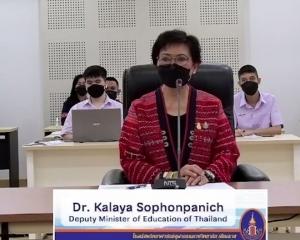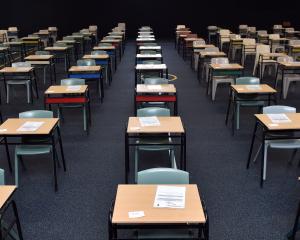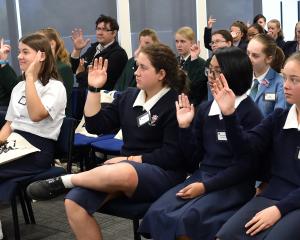
New Zealand Principals Federation conference convener Brent Caldwell said the conference schedule had included 11 prepared questions from the floor after the minister's speech.
"There was never going to be an open forum. The delegates were very keen to hear her answers to their questions but she had another engagement to go to, unfortunately," he said.
Southland Primary Principals Association president Wendy Ryan said she was "appalled" the minister did not stay to answer questions.
"We are so strongly opposed to this, I hoped she would soften. I was really disappointed she talked about how we need to email her and she will fix it without staying to listen to us," she said.
Mrs Ryan had voted to boycott the National Standards training.
"It's really frustrating when you go to a training session and ask questions and sometimes the trainers are unable to answer. And if you do attend, you are seen to support it when you totally disagree with it," she said.
Otago Primary Principals Association president Jenny Clarke said she was concerned about the minister's warnings to teachers who spoke out against National Standards.
"New Zealand holds that right of freedom of speech very dearly. Education is so important and educators need to have the right to convey their concerns," she said.
She did not believe the minister's assertions that the majority of parents supported National Standards.
She also questioned the veracity of the minister's claims that she would respond to every email she received from concerned teachers.
"Some people's experience has been that she hasn't replied. We need to work out why that is happening," she said.
Federation president Ernie Buutvelt said the federation, representing more than half of all primary and intermediate school principals, had "serious concerns" about the National Standards which had been rushed through by the minister.
Mrs Tolley told media after the conference the Government was determined to implement National Standards because it had a clear mandate from voters.
She said teachers withdrawing from training would affect pupils and she needed teachers to participate to monitor and perfect the training.
"We need ongoing discussions. We all want to get it right. Threats and resolutions don't move that forward. Some principals have made up their minds they don't like it," she said.
"It takes them time to adjust. I don't think it is a sector that reacts well to change."
In her speech to the conference, she said no public servants had ever been granted the privilege of picking and choosing which Government laws to administer.
"You are pretty unique among public servants who can speak freely in the media. May I remind you that I made representations to make sure that continues."
"Let's talk to one another, not the media. It's much quicker doing it that way and you will get results, rather than going to the media and making threats, which is just politicking, and achieves little.
"We all know that by themselves the standards won't change things. They merely provide benchmarks that indicate where action is needed. I know the vast majority of schools, regardless of any personal opinions, are getting on with the task of implementing the National Standards."
"Parents have made it clear they want National Standards. Our children need it."
A loud groan erupted from the principals when she said: "I've had good reports on the initial round of training".
She acknowledged, however, 20% of those attending had been unhappy and some trainers had been unable to answer some of the more detailed questions.
New Zealand Educational Institute president Frances Nelson said the Government could no longer ignore the snowballing opposition to its National Standards policy. The standards were irreconcilably flawed and unworkable, she said.
Advertisement












